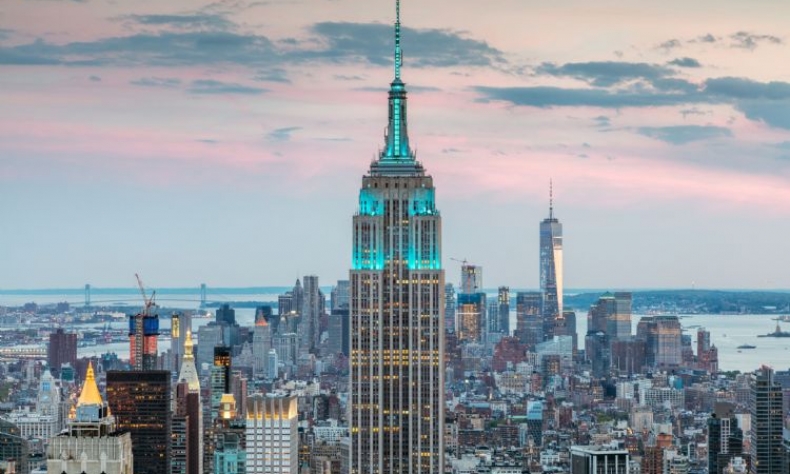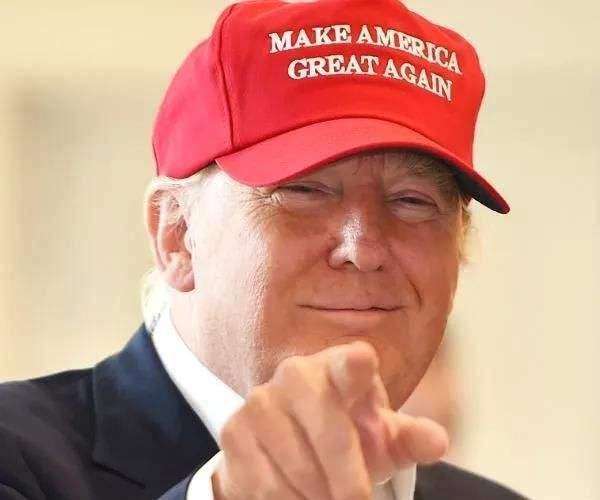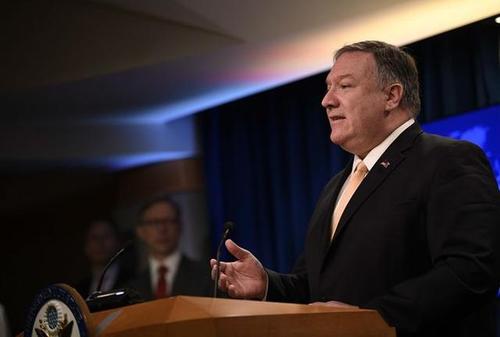Trump’s Lasting Legacy Could be the End of US Global Leadership

Donald Trump’s domestic response to the novel coronavirus has long come under-fire for being unprepared, ill-informed and at times dangerous. But just as problematic for the president has been the invisible presence of the United States from global efforts to supress the spread of COVID-19.
During times of international crises, American administrations have always sought to be on the front foot of any global response. It was the Bush administration in the 1980s that led the worlds fight against the AIDS pandemic by establishing The President’s Emergency Plan For AIDS Relief, while under Obama’s leadership during the 2008 financial crisis, G-20 leaders were able to work together to secure US$1 trillion in funding to help save the world economy from ruin.
Most recently, during the 2014 Ebola epidemic in west Africa, sightings of American planes delivering essential aid to communities were a common sight, as were US politicians and healthcare workers working side-by-side with international partners to facilitate a global response to the problem.
 Donald Trump’s international response to COVID-19 however has ushered in a completely different approach. At a time when countries are facing their most significant challenge for a hundred years, America has gone AWOL (absent without leave). Gone have been sightings of US planes sending aid to those most vulnerable or of American politicians working with fellow world leaders and international organizations to curb the viruses spread. Instead they’ve been replaced with images of bizarre press conferences, attacks on international institutions, slanderous claims against fellow world leaders and accusations of “incompetency”.
Donald Trump’s international response to COVID-19 however has ushered in a completely different approach. At a time when countries are facing their most significant challenge for a hundred years, America has gone AWOL (absent without leave). Gone have been sightings of US planes sending aid to those most vulnerable or of American politicians working with fellow world leaders and international organizations to curb the viruses spread. Instead they’ve been replaced with images of bizarre press conferences, attacks on international institutions, slanderous claims against fellow world leaders and accusations of “incompetency”.
Coronavirus may only have been with us a matter of months, but in its short time it has exposed levels of selfishness, hopelessness and a lack of character “unparalleled in US history” according to Stephen Walt, professor of international relations at Harvard, causing a crisis of American global leadership that could be irreversible.
US global leadership in decline before pandemic
That is not to say COVID-19 is the only trigger for this. American global leadership has been in decline over recent years due in part to a shift of power from west to east which has challenged America’s overall position as the undisputed global super power since the end of the Cold War.
Trump’s “America First” policy has further contributed to this, with his ambition to “make America great again” coming at the expense of its leadership in fights against climate change, peace in the Middle East and world security. His instance on picking fights with allies, publicly ridiculing important political figures and waging lengthy economic sanctions on friend and foe alike has further exposed the US as no longer the great defender of multilateralism that it has been in the past.
 That said, Trump’s haphazard response to the pandemic has accelerated the opinion that its global leadership is waning fast.
That said, Trump’s haphazard response to the pandemic has accelerated the opinion that its global leadership is waning fast.
His decision to incessantly lay blame at China for the coronavirus, much to the dismay of fellow world leaders, has stunted any meaningful agreements at recent G20 and G7 meetings, and the establishment of a COVID-19 task force. Reports from those meeting state that Trump pushed hard to have “Wuhan-Virus” added into the final text of any agreement, creating a stalemate at a time when member countries were looking for leadership.
On April 15, President Trump announced that he had instructed his administration to suspend funding for the World Health Organisation (WHO). Before this decision, Trump’s incessant attacks on the WHO and its Director-General Tedros Adhanom, despite general approval of the body’s performance so far, have been heavily criticised. Global leaders, medical professionals and health experts have been unequivocal in their condemnation of his recent decision to pull funding from the organization, with UN Secretary-General António Guterres stating the coronavirus pandemic is “not the time” for such action and the American Medical Association (AMA) calling it a “dangerous step in the wrong direction” which risks endangering the lives of those most vulnerable to the virus.
Some US senators said that Trump is looking to shift the blame from his administration to the WHO. Just as the BBC reported on April 4, the WHO “approved a coronavirus test in January but the US decided against using it, developing its own test instead. However, in February, when the testing kits were dispatched, some of them didn’t work properly, and led to inconclusive results. Public health experts say the delay enabled the virus to spread further within the US.”
Allies are starting to turn on US
Allied-countries, which have for so long put up with Trump’s actions, have also began to turn on him during the virus, unimpressed and tired of his lack of leadership and egotistical nature. The accusation of “modern-day piracy” levelled at the US by German politician Andreas Geisel stemmed from reports that 200,000 masks intended for the Berlin police force were reportedly hijacked by the US, and came after claims by French officials that the US was engaging in “wild-west” tactics when procuring masks and other important equipment.
His administration’s decision to try and buy the rights to a COVID-19 vaccine currently being researched in Germany drew further scorn from officials in the country and the rest of Europe, who fear Trump would try to monopolize the drug for his own personal gain, showing how far levels of distrust have reached between the two parties.
 The US’ own aid package to countries in need of assistance is also uninspiring, despite US Secretary of State Mike Pompeo claims that the US remains an “undisputed leader” in driving global aid and that “no country can match its generosity”. Only 0.06 percent of the US$2 trillion relief package approved by the Senate in March is intended to be given to foreign countries, while a separate US$225 million fund for international coronavirus aid is hardly the enormous sum many were expecting from the world’s largest economy.
The US’ own aid package to countries in need of assistance is also uninspiring, despite US Secretary of State Mike Pompeo claims that the US remains an “undisputed leader” in driving global aid and that “no country can match its generosity”. Only 0.06 percent of the US$2 trillion relief package approved by the Senate in March is intended to be given to foreign countries, while a separate US$225 million fund for international coronavirus aid is hardly the enormous sum many were expecting from the world’s largest economy.
The sight of the US itself having to rely on donations from other countries is something that has damaged opinion that American leadership is competent, given it cannot even procure enough to help itself. Russia companies, some currently under investigation by the US government, have donated face masks to cities in the US, while the Chinese government has stepped in to provide New York City with 1,000 lifesaving ventilators, a move Governor Andrew Cuomo called “a big deal [that’s] … going to make a significant difference for us”.
China and Russia have been largely visible in providing aid to countries as the US has retreated to manage its own domestic shortcomings. According to the Chinese Ministry of Commerce, Chinese companies have sent 3.86 billion face masks and 37.52 million pieces protective gear to cities across the world, while at the same time, the US government has threatened to seize by force any equipment manufactured by American companies intended to be sent to other countries for its own personal use.
Trumps own unconventional press briefings, where he regularly shoots from the hip and relies on hunches rather than scientific reason, have also done little to show American leadership in a positive light. His extraordinary performance on April 14, where he labelled journalists as “fake” and regularly perpetuated lies as facts were a new low for the president, with many domestic and international news commentators calling it the worst press briefing of any US president in history.
Add accusations of missteps during the early stages of the US response, disproportional numbers of ethnic minorities and vulnerable citizens being left unprotected by the virus and numerous cases of US doctors and nurses battling coronavirus without essential equipment, it is no wonder academics are suggesting the US’ position as the worlds most powerful and influential country looks to be waning.
A G7 meeting scheduled for April 16 has raised the possibility that the US could still play a role in the world’s fight against COVID-19, which has now claimed over 120,000 lives and infected over 2 million people. But with every opportunity that goes amiss, the United States position as the world’s global leader is put further in jeopardy and becomes less and less likely to be resurrected.
 Facebook
Facebook
 Twitter
Twitter
 Linkedin
Linkedin
 Google +
Google +







